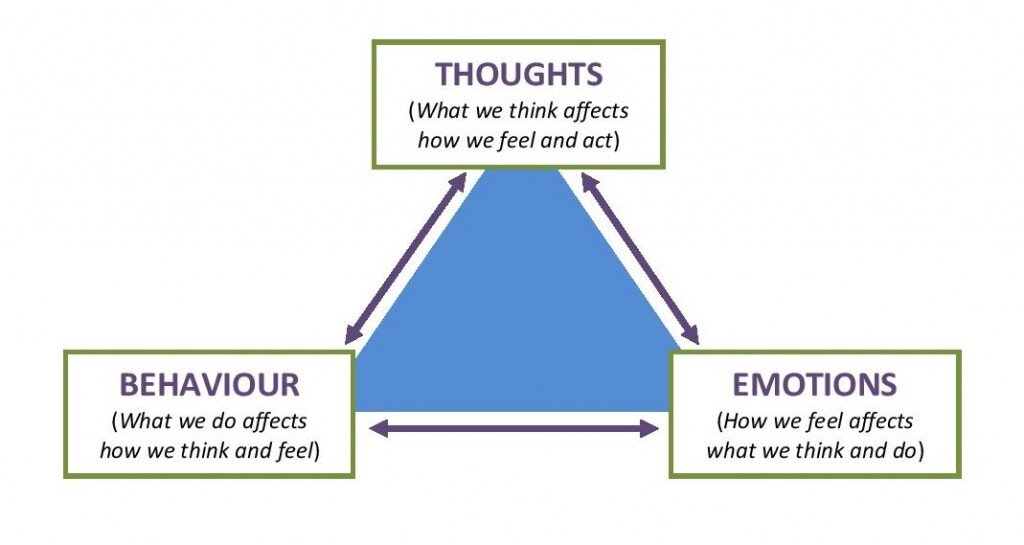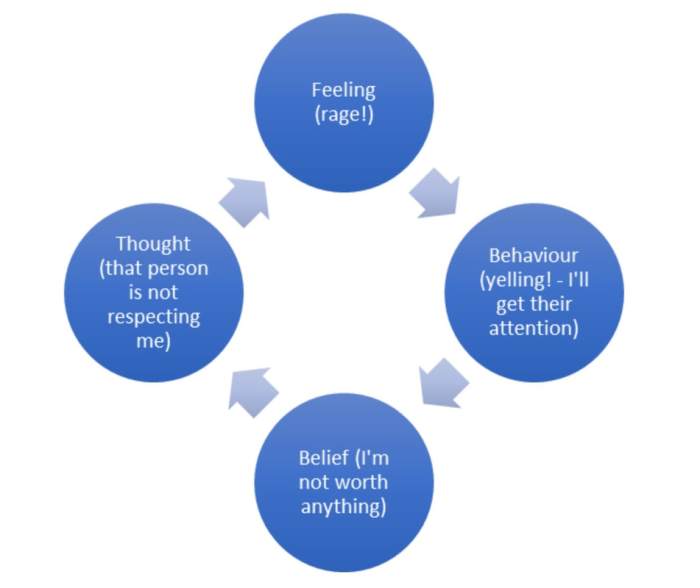Your thoughts behaviours and emotions are… everfi – Your thoughts, behaviors, and emotions are inextricably linked, forming a dynamic system that shapes your overall well-being. Understanding this interconnectedness is crucial for personal growth and development.
Delving into the nature of this relationship, we explore how our thoughts trigger behaviors and emotions, how our behaviors reinforce or alter our thoughts and emotions, and the profound impact these have on our lives.
Understanding Your Thoughts, Behaviors, and Emotions: Your Thoughts Behaviours And Emotions Are… Everfi

Understanding your thoughts, behaviors, and emotions is crucial for personal growth and well-being. These three components are interconnected and have a significant impact on your overall experience of life.
Your thoughts, which can be conscious or unconscious, influence your behaviors and emotions. Negative thoughts, such as self-criticism or pessimism, can lead to negative emotions and unhealthy behaviors. Conversely, positive thoughts can promote positive emotions and constructive behaviors.
Your behaviors, in turn, shape your thoughts and emotions. Engaging in positive behaviors, such as exercise or spending time in nature, can improve your mood and boost your self-esteem. Negative behaviors, such as substance abuse or isolation, can reinforce negative thoughts and emotions.
Emotions are powerful forces that can motivate your behaviors and influence your thoughts. Intense emotions, such as anger or fear, can cloud your judgment and lead to impulsive decisions. However, emotions can also be positive and energizing, driving you towards meaningful goals.
Exploring the Relationship between Your Thoughts, Behaviors, and Emotions
The relationship between your thoughts, behaviors, and emotions is complex and dynamic. Your thoughts can trigger certain behaviors, which in turn elicit emotions. For example, if you have negative thoughts about your appearance, you may avoid social situations, which can lead to feelings of loneliness and isolation.
Similarly, your behaviors can reinforce or change your thoughts and emotions. If you engage in positive behaviors, such as practicing gratitude or volunteering, you may develop more positive thoughts about yourself and the world. Conversely, negative behaviors, such as dwelling on negative events, can reinforce negative thoughts and emotions.
Analyzing the Impact of Your Thoughts, Behaviors, and Emotions on Your Life
Your thoughts, behaviors, and emotions can have a profound impact on your life. Negative thoughts, behaviors, and emotions can lead to negative outcomes, such as relationship problems, poor work performance, and low life satisfaction. For example, if you have negative thoughts about your abilities, you may be less likely to pursue opportunities that could lead to success.
Conversely, positive thoughts, behaviors, and emotions can lead to positive outcomes, such as healthy relationships, career success, and overall well-being. For example, if you have positive thoughts about yourself, you may be more likely to set challenging goals and take risks that could lead to personal growth.
Strategies for Changing Your Thoughts, Behaviors, and Emotions, Your thoughts behaviours and emotions are… everfi
Changing your thoughts, behaviors, and emotions is not always easy, but it is possible. There are a number of techniques that you can use to change your thinking patterns, break negative behavior cycles, and manage your emotions more effectively.
Some common strategies include:
- Cognitive restructuring: Identifying and challenging negative thoughts and replacing them with more positive ones.
- Behavioral activation: Engaging in activities that bring you joy and meaning, even when you don’t feel like it.
- Mindfulness: Paying attention to your thoughts, feelings, and sensations without judgment.
- Emotion regulation: Learning techniques to manage your emotions in a healthy way, such as deep breathing or exercise.
Creating a Plan for Personal Growth and Development
Setting goals for personal growth and development is an important step in changing your thoughts, behaviors, and emotions. A well-crafted plan will help you stay focused and motivated on your journey.
To create a plan for personal growth and development, follow these steps:
- Identify your areas for growth. What are the thoughts, behaviors, or emotions that you would like to change?
- Set specific, measurable, achievable, relevant, and time-bound (SMART) goals. For example, instead of saying “I want to be more positive,” say “I want to practice gratitude for five minutes each day.”
- Develop a plan of action. How will you achieve your goals? What steps do you need to take?
- Identify potential challenges and develop strategies for overcoming them. For example, if you know that you tend to give up easily, you might develop a plan for staying motivated.
- Seek support from others. Share your goals with friends, family, or a therapist. Having a support system can help you stay accountable and motivated.
Expert Answers
How can I change my negative thoughts?
Cognitive reframing techniques, such as challenging negative thoughts and replacing them with more positive ones, can help change negative thought patterns.
How do my emotions influence my behaviors?
Emotions can motivate or inhibit certain behaviors. For example, fear can lead to avoidance behaviors, while joy can promote social engagement.
What is the impact of my thoughts on my relationships?
Negative thoughts can damage relationships by creating mistrust and conflict, while positive thoughts can foster connection and understanding.


